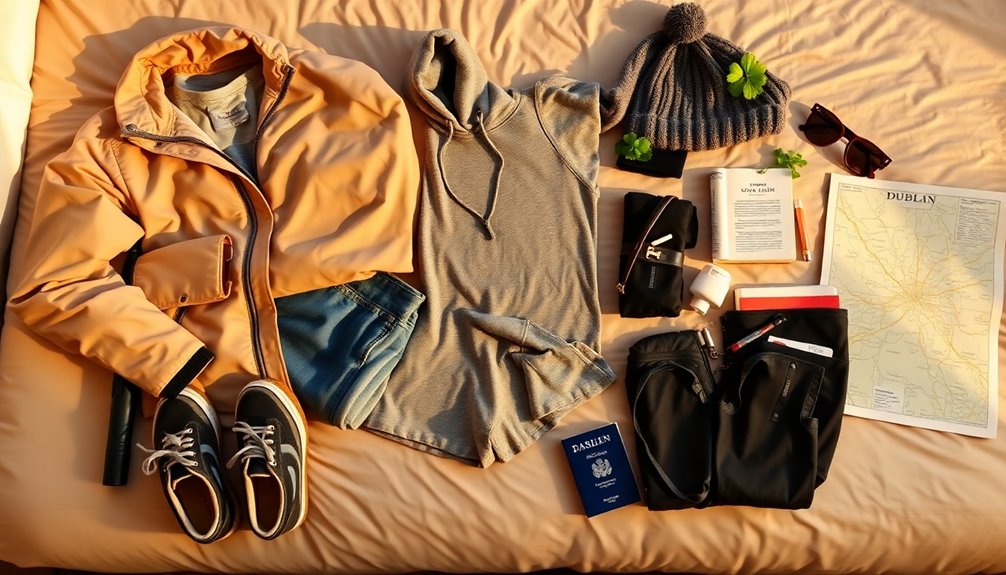
Looking for a teen summer English program in Ireland? Choose between homestay, residence, or activity-focused courses based on your teen’s independence and interests, and start planning 6–9 months ahead to secure spots and housing. Budget for tuition, meals, activities, visas and travel, and prioritise Garda-vetted hosts or supervised residences near transport. Pack meds, insurance, and emergency contacts, build simple daily language routines, and set post-program goals—keep going for practical tips on applications, safety, and saving.
Highlights
- Choose program type (residential, homestay, city-based, activity-focused) based on the teen’s independence, interests, and learning style.
- Start planning 6–9 months ahead and gather passport, consent, health forms, and check application and payment deadlines.
- Budget for tuition, accommodation, meals, activities, travel, visas, and keep expenses tracked in a simple spreadsheet.
- Prioritize safe, vetted accommodation near classes or transport, and confirm emergency procedures, curfews, and roommate arrangements.
- Build daily language routines (vocab cards, conversation goals, journaling) and use cultural activities for immersive practice and confidence.
Choosing the Right Program Type for Your Teen
Wondering which summer English program will suit your teen best? You’ll weigh program comparisons: residential, homestay, city-based, or activity-focused options. Think about your teen’s learning style, independence level, and specific interests — sports, arts, exam prep, or cultural immersion. Short stays offer sampling; longer ones build real progress. Check class size, teacher credentials, extracurricular balance, and safety policies. Ask how much freedom your teen’ll have day-to-day and whether supervision matches your comfort. Compare costs against included extras. Pick the type that opens up growth and joy, not just language drills, so they’ll return inspired.
Timeline: When to Apply and Secure Placement
Because popular teen programs fill fast, you should start planning at least 6–9 months before summer to get the options, dates, and housing you want. Begin by checking application deadlines for each program and note early-bird or rolling deadlines. Prioritize programs with limited program availability or specialty tracks. Apply early to secure preferred dates, roommate choices, and homestay or dorm placements. Keep documents ready—passport, parental consent, and health forms—to avoid delays. After applying, confirm placement and payment deadlines, and ask about waitlist policies. This timeline gives you flexibility to change plans while keeping choices wide open.
Budget Planning and Quick Cost-Saving Tips
Start by listing the program fee breakdown so you know what’s included and what’s extra. Compare accommodation options—host families, student residences, or shared rentals—to find the best value. Save on travel and meals with advance train or bus tickets and simple grocery-based meals rather than eating out every day.
Program Fee Breakdown
When planning your teen’s summer English program in Ireland, break down the total fee into core components—tuition, accommodation, meals, activities, and administration—to see exactly where your money goes and spot easy savings. Start with the program fee structure: list base tuition, optional excursions, material fees, insurance, and registration charges. Compare packages to decide what’s essential. Check financial aid options, early-bird discounts, and sibling or group rates to lower costs. Factor in visas and travel separately. Keep a simple spreadsheet, set a clear budget cap, and choose flexible add-ons so your family can enjoy freedom without surprise expenses.
Accommodation Cost Hacks
Looking for easy ways to cut accommodation costs for your teen’s summer stay in Ireland? Start by listing accommodation types — homestays, shared apartments, student residences — then do a quick cost comparison to spot real savings. Choose flexible dates, book early for discounts, and consider week-by-week bookings to avoid unnecessary nights. Share rooms or arrange teen roommates to divide rent and utilities. Negotiate longer-stay rates with providers and check for included essentials like laundry and Wi‑Fi. Use verified platforms and read recent reviews to avoid hidden fees. Small adjustments equal freedom: save smart, keep options open, and protect your budget.
Travel and Meal Savings
3 simple travel and meal strategies can shave a lot off your teen’s summer budget without sacrificing convenience: book flights and trains early and mid-week for lower fares, use student or youth travel cards for discounts, and plan meals around a mix of self-catering and affordable local options. You’ll want to hunt seasonal travel discounts and compare apps to lock best rates. For meal planning, set a weekly grocery budget, prep easy lunches, and let your teen try market food for cultural fun. Balance freedom with limits: give a per-day cash cap and teach smart choices that stretch funds.
Selecting Safe and Convenient Accommodation Options
Choosing the right place to stay is one of the most important decisions you’ll make for your teen’s summer in Ireland. Consider safety standards first: check Garda vetting, emergency procedures, and local reviews. Balance independence and supervision by comparing accommodation types—host family, student residence, or supervised homestay. Look for proximity to classes and public transport to maximize freedom without long commutes. Ask about roommate arrangements, curfews, and staff availability. Confirm laundry, meal options, and secure storage for valuables. Get clear written policies on visitors and emergencies. Touring options in advance or virtual walkthroughs will help you choose confidently.
Preparing Travel Documents and Insurance Fast
Because travel documents and insurance can’t be rushed at the last minute, start assembling everything early so you don’t hit delays that could cancel plans. Check passport validity now — some countries require six months beyond your stay, so passport renewal can take weeks. Scan copies of passport, visa pages, and parental consent forms, storing them digitally and with a trusted contact. Compare travel insurance plans that cover medical care, emergency evacuation, and activity-specific risks; pick one with clear claims steps. Keep printed policy numbers and emergency contacts handy. Staying organized gives you freedom to enjoy Ireland without paperwork stress.
Packing Checklist for an Irish Summer Stay

When packing for an Irish summer stay, think layers and weather-ready items so you’ll be comfortable from misty mornings to sunny afternoons. Pack essential clothing: waterproof jacket, light sweaters, breathable tees, and comfortable shoes. Include cultural items like a modest outfit for host-family events and a small gift. Bring travel gadgets and electronics needs: universal adapter, power bank, headphones. Don’t forget personal hygiene basics and any meds. Use packing strategies: roll clothes, use cubes, limit luggage to essentials to stay mobile. Add items for leisure activities—swimwear, a journal, and a compact daypack for exploring.
Maximizing Language Progress With Daily Routines
If you want to make real progress in English during your stay, building simple daily routines will get you farther than sporadic study sessions. You’ll boost language immersion by blending classes with tiny habits: morning vocab cards, lunchtime conversation goals, and evening reflection in a journal. Keep it flexible—pick activities that fit your freedom-seeking spirit: café chats, podcasts on walks, or short films with subtitles. Consistent daily practice beats cramming; track one achievable target per day and celebrate wins. Over weeks those small steps become confident speaking, clearer listening, and a habit you’ll keep after Ireland.
Local Transport and Navigation Essentials for Students
You’ll find public buses, trains, and trams make getting around Irish towns easy, so learn key routes and peak times before you travel. Walking and cycling are common and safe in many areas, so bring comfortable shoes and consider renting a bike for short trips. Get a student or weekly ticket/pass where available to save money and avoid hassle with single fares.
Public Transport Basics
Getting comfortable with local buses, trains, and trams will make your stay in Ireland smoother and more fun—so learn the main routes, ticket types, and peak times before you travel. You’ll find bus services and train routes cover cities and towns well; check timetables and downloadable maps. Buy reusable tickets or travel cards for savings, and know off-peak fares. Plan connections, allow extra time for delays, and ask staff or fellow riders if you’re unsure. Keep valuables close, validate tickets where required, and download transport apps for real-time updates. Doing this gives you freedom to explore confidently.
Walking and Cycling
Walking and cycling are the easiest, cheapest ways to see Irish towns and cities—so learn a few basics before you set out. You’ll enjoy walking benefits like flexibility, fresh air, and discovering hidden spots at your own pace. Stick to pedestrian crossings, wear comfortable shoes, and carry a small map or phone charger. If you cycle, choose marked cycling routes and check bike condition, lights, and helmet fit. Ride predictably, signal turns, and respect bus lanes where signs allow. Aim for quieter streets or riverside paths for freedom and safety, and ask locals for their favorite safe routes.
Ticketing and Passes
After you’ve explored streets and cycle paths, learning how tickets and passes work will save time and money when you’re ready to use buses, trams, or trains. You’ll find single, return, day and weekly ticket types — pick what matches your plans. Leap cards and student passes cut fares and make tap-on/off travel easy. If you’re moving between cities, check regional rail passes. Travelling with friends? Ask about group discounts for outings and tours. Keep an eye on peak vs off-peak rates, validate tickets when required, and store passes on your phone or card so you can roam freely.
Cultural Immersion: Easy Activities to Boost Confidence
While you explore Ireland, simple cultural activities can quickly build your confidence speaking English and connecting with locals. Join cultural workshops to practice conversation, learn music or dance, and ask questions — you’ll feel braver each time. Try local cuisine at markets or family-run cafés; order, chat with vendors, and describe flavors to boost vocabulary. Volunteer briefly at community events or language tandems to swap skills and stories. Take walking tours, use your voice to ask directions, and journal new expressions. These low-pressure, freedom-friendly steps help you speak more naturally and enjoy authentic connections across Ireland.
Health, Safety, and Emergency Preparedness Steps
Feeling confident speaking with locals is great — now let’s make sure you’re safe and prepared so your time in Ireland stays fun and stress-free. Pack any meds, carry a simple first-aid kit, and follow basic health precautions like staying hydrated, using sunscreen, and washing hands after activities. Know allergy triggers and where to get local care. Share your itinerary with a trusted adult and store emergency contacts in your phone and on paper. Learn simple local emergency procedures and transport options. Trust your instincts, stay aware at night, and ask staff for help whenever something feels off.
Post-Program Steps: Follow-Up Learning and Certificates

When you get home, keep the momentum by reviewing notes, staying in touch with classmates, and setting clear goals for what you want to improve next. Use post program reflection to list strengths, gaps, and daily habits you’ll adopt—short, actionable steps work best. Schedule weekly mini-lessons, join online conversation groups, and swap feedback with peers to stay accountable. Keep your certificate somewhere visible; understand certificate significance when applying for exchanges, college programs, or part-time work. Treat it as proof of progress, not the finish line. Celebrate gains, adapt your plan, and keep exploring language freely.
Some Questions Answered
Can Parents Attend Short Campus Visits During the Program?
Yes — you can often arrange short campus visits. Parent participation is usually welcome for brief drop-ins, orientation check-ins, or special campus activities, though you’ll need to follow the program’s visitor rules and scheduled times. Contact the program in advance to confirm allowed hours, ID requirements, and any fees. You’ll get clear guidance so your visit’s relaxed, respectful of students’ independence, and aligned with safety and scheduling needs.
Are Dietary Restrictions Accommodated in All Meal Plans?
Yes — most programs accommodate dietary restrictions, but policies vary. Contrasting convenience with choice, you’ll find standard meal options alongside tailored alternatives for allergies, vegetarian, vegan, halal, or other dietary preferences. You’ll need to notify organizers ahead, provide details, and sometimes medical notes. Staff and catering try to be flexible, but double-check menus and limits before booking so you’ll have the freedom to eat safely and enjoyably.
Can Students Take Standardized English Exams During the Program?
Yes — you can usually take standardized English exams during the program. You’ll get exam preparation integrated into lessons and optional workshops, and staff will help with registration. Testing schedules vary by center and exam type, so you’ll want to check dates early to keep your travel plans flexible. If you need specific exams or accommodations, tell coordinators in advance so they can arrange materials, practice tests, and logistics.
Is There a Minimum/Maximum Group Size for Classes?
Yes — there’s typically a minimum and maximum class size to keep things effective. You’ll find small classes (8–12) that boost participation and flexible group dynamics, or slightly larger ones (15–18) when you want more social variety. That structure guarantees you get focused teaching while still enjoying peer interaction and freedom to explore. If you prefer a specific size, ask providers — many can accommodate preferences or offer extra options.
Are Smartphone SIM Cards and Data Plans Provided on Arrival?
No, they aren’t automatically provided, but you’ll have smartphone options waiting if you want them on arrival. You can buy local SIM cards or short-term data plans at the airport or nearby shops; staff can help you choose based on data coverage and budget. If you prefer, you can bring a free phone and pick a plan yourself. Either way, you’ll have flexible, freedom-friendly choices to stay connected.
Summing Everything Up
You’ve got a solid roadmap now, so go ahead and pick the program that fits your teen’s needs and timeline — don’t dawdle like it’s the Dark Ages. Lock in placements, budget for essentials, and choose safe, convenient housing. Get passports, visas, and insurance sorted early, learn local transport basics, and plan simple cultural activities to build confidence. Pack health info, emergency contacts, and follow up with study routines and certificates after you return.
